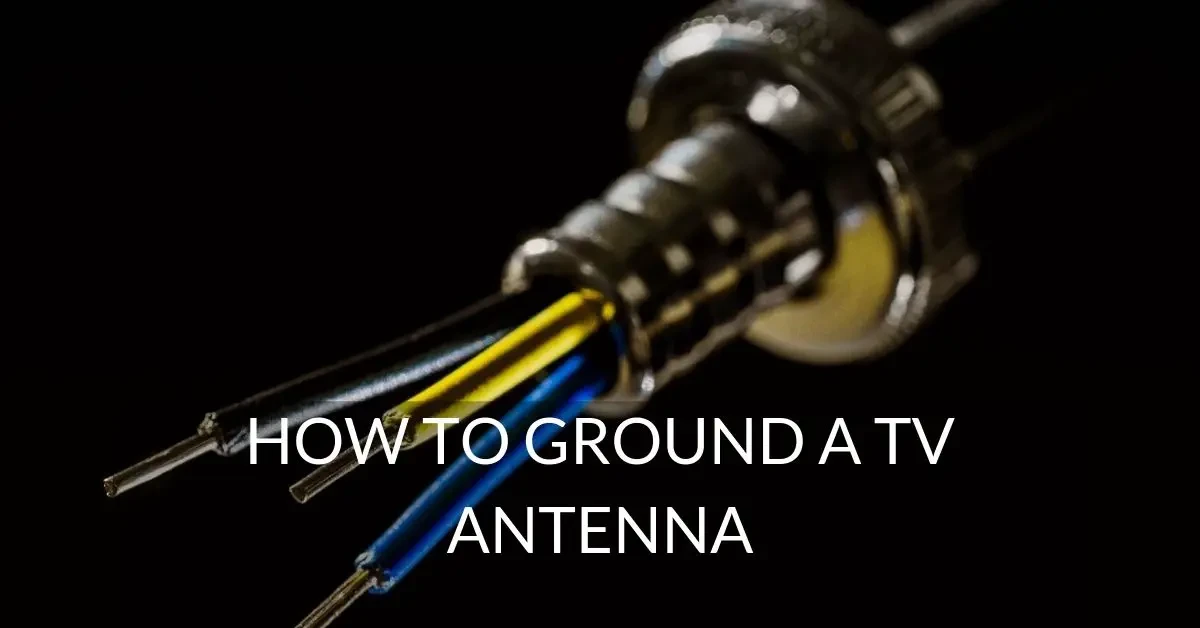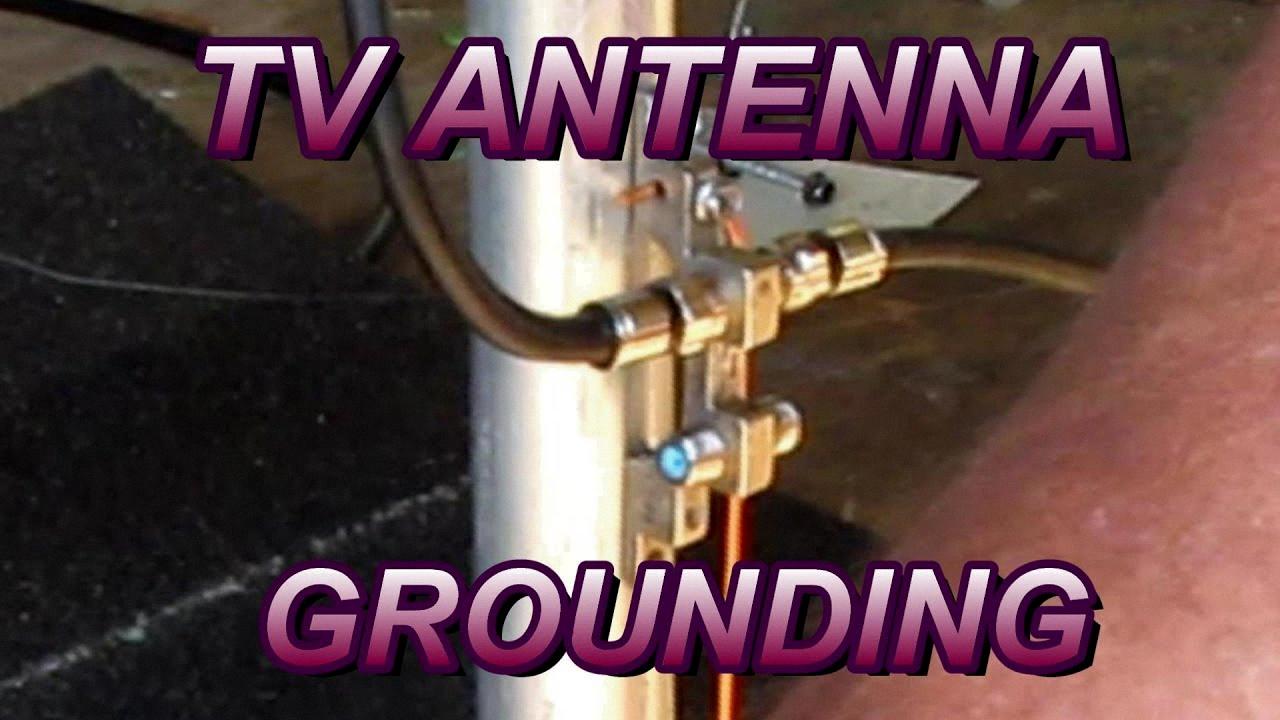If you’re planning on installing a TV antenna for your home, it’s important to understand the importance of grounding the antenna. Grounding your TV antenna is a crucial step to ensure optimal performance and safety.
Firstly, it’s important to understand what grounding means. Grounding is a process of connecting an electrical component to the earth with a conductor. In the case of TV antennas, grounding is important to protect your home from lightning strikes, reduce interference, and improve signal quality.
Why is grounding important for TV antennas?
TV signals are essentially made of electricity, and an antenna is designed to capture that electricity. Without proper grounding, the excess electricity from a lightning strike or power surge can travel through your antenna and into your home, potentially causing damage to your electronic devices or even starting a fire.
Additionally, a properly grounded antenna can help reduce interference from other electronic devices in your home, such as microwaves, cell phones, or even nearby radio towers.
A grounded antenna also helps to improve the overall signal quality and reception of your TV. This is because a grounded antenna is less likely to pick up unwanted noise or signals, leading to a cleaner and more reliable signal.
How to ground your TV antenna?
Grounding your TV antenna is a relatively simple process that can be done by following a few basic steps:
1. Locate a suitable ground point. This can be a metal water pipe, a grounding rod, or a metal stake driven into the ground. Make sure the point is at least 6 feet away from any power lines or electrical equipment.
2. Install a grounding block. This is a small device that connects the coaxial cable from your antenna to the grounding point. The grounding block should be installed as close to the point of entry into your home as possible.
3. Connect the grounding wire. Use a copper wire to connect the grounding block to the ground point. The wire should be at least 8 gauge and be as short as possible.
4. Test the connection. Use a multimeter to test the continuity of the grounding wire. This will ensure that the connection is secure and that there are no breaks or gaps in the wire.
Grounding your TV antenna is a crucial step to ensure optimal performance and safety. By following these simple steps, you can protect your home from lightning strikes, reduce interference, and improve signal quality. Remember to always use caution and follow safety guidelines when working with electrical components.

Do TV Antennas Require Grounding?
It is important to ground your TV antenna. All outdoor TV antennas should be grounded to protect your home and electronics from lightning strikes and power surges. When lightning strikes your antenna, it can send a surge of electricity down the coaxial cable and into your home, potentially damaging your TV and other electronics. Grounding the antenna provides a path for the electricity to safely dissipate into the ground. Even if your antenna is made of plastic, it still contains metal components that can conduct electricity. Therefore, it is recommended to ground any outdoor antenna you install.

Does Grounding a TV Antenna Improve Reception?
Grounding a TV antenna does not directly improve reception. The purpose of grounding an antenna is to prevent electrical shocks and protect against power surges caused by lightning strikes. However, an improperly grounded antenna can cause interference and reduce signal quality. Therefore, it is important to ensure that the antenna is properly grounded according to local electrical codes and manufacturer instructions. while grounding is important for safety reasons, it does not directly improve TV reception.
Consequences of Not Grounding an Antenna
If you don’t ground your antenna properly, you may experience a range of issues that can negatively impact the performance of your antenna. Here are some of the potential consequences of not grounding your antenna:
1. High SWR Levels: Without proper ground, your antenna system may have high standing wave ratio (SWR) levels, which can cause significant signal loss and even damage to your equipment.
2. Interference: Unwanted radio frequency interference (RFI) can be picked up by your antenna if it is not grounded correctly. This can lead to distorted or unclear signals and reduced performance.
3. Electrical Shock: If your antenna is not grounded properly, it can become electrified, posing a potential risk of electric shock to you or anyone who comes in contact with it.
4. Lightning Strike Damage: Lightning can cause significant damage to your antenna system if it is not properly grounded. Without a solid grounding system, lightning can travel through your antenna and cause damage to your equipment and even start a fire.
Failing to ground your antenna can lead to a range of issues, including high SWR levels, interference, electrical shock, and lightning strike damage. Therefore, it is essential to ensure that your antenna is grounded correctly to avoid these potential problems and ensure optimal performance.
The Necessity of Grounding an Antenna Mast
An antenna mast must be grounded. In fact, it is mandated by the National Electric Code (NEC) to ensure the safety of the device and the people who use it. Grounding the antenna mast provides a path for excess electrical energy to flow into the ground instead of damaging the device or causing harm to people.
Grounding the antenna mast also helps to reduce radio frequency interference (RFI) caused by nearby electrical equipment. This interference can disrupt the signal and cause poor reception. By grounding the mast, you can reduce the RFI and improve the quality of the signal.
To ground the antenna mast, you can use a grounding rod, which is a metal rod driven into the ground near the mast. The mast is then connected to the grounding rod using a copper wire. It is important to ensure that the grounding rod is installed correctly and securely to ensure proper grounding.
Grounding the antenna mast is crucial for the safety of the device and the people who use it, as well as to reduce radio frequency interference. It is also mandated by the National Electric Code.
Conclusion
Grounding your outdoor TV antenna is a crucial step that should not be overlooked. Not only does it ensure proper functionality of your antenna, but it also protects against potential lightning strikes and transient voltages. The National Electric Code (NEC) mandates the grounding of antenna masts, and failure to abide by this code can result in poor performance and potentially dangerous situations. It is important to note that even newer plastic antennas contain metal inside and are designed to capture electricity, making grounding a necessary precaution. By properly grounding your antenna mount, you can ensure the best possible TV signal and protect your home and family from potential electrical hazards.








